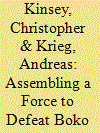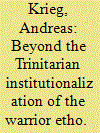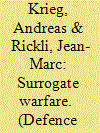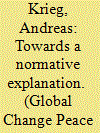|
|
|
Sort Order |
|
|
|
Items / Page
|
|
|
|
|
|
|
| Srl | Item |
| 1 |
ID:
178661


|
|
|
|
|
| Summary/Abstract |
In the context of an increased use of commercial soldiers in high-end conflict, this article investigates how the Nigerian government's reliance on the global market for force has helped its efforts to counter Boko Haram. The article shows, through a case study of Nigeria's counterinsurgency campaign against jihadist insurgents, that states in the developing world can augment their ability to provide effective public security by creating security assemblages. Moving beyond the normative debate about Private Military Companies (PMCs), this article highlights that public-private security arrangements can support the state in the developing world to live up to its role as a communal security provider. Nigeria's employment of the South African PMC Special Tasks, Training, Equipment and Protection Ltd. (STTEP), helped it build an effective public-commercial partnership, thus providing the Nigerian Armed Forces (NAF) with capacity, capability and norms that were essential in their counterinsurgency struggle.
|
|
|
|
|
|
|
|
|
|
|
|
|
|
|
|
| 2 |
ID:
128951


|
|
|
|
|
| Publication |
2014.
|
| Summary/Abstract |
Traditionally in liberal normative theory the warrior's ethos has been defined on basis of the warrior's raison d'être as the trinitarian protector of the social contractarian discretionary association of society and state. Since the post-modern warrior, whether serving in state uniform or as an employee of a commercial enterprise, is increasingly asked to provide security as a global rather than public good on the liberal state's behalf in non-trinitarian contingency operations, this paper provides a broader normative conceptualization of the post-modern warrior ethos. Trinitarian operations in this respect are defined as those operations that revolve around the state soldier's primary trinitarian function of providing security for society and state as a member of the Clausewitzian trinity of society, state and soldier. Instead of solely conceptualizing the warrior's ethos as a narrow trinitarian institutionalization process, this paper demonstrates that for the warrior who provides security increasingly in non-trinitarian operations, the post-modern warrior ethos becomes more and more an alternatively institutionalized characteristic of spirit beyond the social contractarian trinity. Shaping both the soldier's and the contractor's commitment in non-trinitarian contingency operations, the alternative non-trinitarian institutionalization of the warrior's ethos ensures that the post-modern warrior remains a virtuous and committed security service provider amid high operational risks even when serving the interests of common humanity rather than of his family, state and nation.
|
|
|
|
|
|
|
|
|
|
|
|
|
|
|
|
| 3 |
ID:
145267


|
|
|
|
|
| Summary/Abstract |
In the aftermath of the Arab Spring the Middle East has plunged into a state of instability. The United States has responded to these rising insecurities in a region of strategic importance with hesitation or half-hearted commitments. The Obama administration, plagued by the increasingly difficult decision of defining America's role in an apolar world while managing the political and economic legacy of the Bush administration, has relied on a policy of delegation. Obama neither refrained from military options nor showed any willingness to commit American ground troops to one of the strategically and operationally most complex environments of the world. Instead, Obama's preferred way of war is one relying on surrogates—both human and technological—that allow the United States to externalize, partially or wholly, the strategic, operational and tactical burden of warfare. Unlike any other previous US administration surrogate warfare has become the principal means of protecting US interests in the Middle East that are perceived to be all but vital. The need for deniability and legitimacy, cost–benefit considerations as well as the lack of capability have made warfare by surrogate a preferred option in the Middle East. The consequences for US policy in the region are profound, as the lack of control and oversight have empowered surrogates whose long-term interests are not compatible with those of the United States. More severely, the US might have jeopardized its standing as the traditional guarantor of security in the Middle East— something that partners and adversaries alike have exploited.
|
|
|
|
|
|
|
|
|
|
|
|
|
|
|
|
| 4 |
ID:
159186


|
|
|
|
|
| Summary/Abstract |
Airpower, drones and cyber-weapons are employed by states in conjunction with local armed non-state actors in an effort to coercively intervene in the crises of the twenty-first century. While the externalization of the burden of warfare is a return to pre-modern war, it is the change in the underlying socio-political relations between the state and its military agent that is a novel phenomenon in surrogate warfare. This article demonstrates that in a post-Westphalian era characterized by non-state violence, globalized conflicts, a prioritization of risk management in a mediatized environment, the state has to explore new ways to remain relevant as the primary communal security provider. Thereby, the organization of violence has departed from the employment of the state’s soldier as the primary bearer of the burden of warfare to a mode of war where technological and human surrogates enable the state to manage the risks of post-modern conflict remotely. In this article, we conceptually explore surrogate warfare as a socio-political phenomenon within the context of globalized, privatized, securitized and mediatized war.
|
|
|
|
|
|
|
|
|
|
|
|
|
|
|
|
| 5 |
ID:
125073


|
|
|
|
|
| Publication |
2013.
|
| Summary/Abstract |
The heavy direct or indirect reliance of liberal states on the military and security services of the private contractor in contemporary warfare is an undeniable reality. While the literature presents a wide array of different empirical explanations of why liberal states have come to increasingly rely on contractor support, this paper attempts to give a normative explanation to this development. This paper does not aim to refute the existing explanations but merely complement the most commonly stated reasons for outsourcing. It argues that the liberal state's hiring of private contractors can be understood against the backdrop of a wider trend whereby liberal states, increasingly operating in non-trinitarian operations, attempt to replace the soldier as a trinitarian servant with non-trinitarian means of warfare. This correlation between liberal state commitments in non-trinitarian warfare and a growing employment of non-trinitarian means of warfare can be explained by Social Contract theory and lays the foundation for a normative understanding of why liberal states resort to non-trinitarian contractor support amid non-trinitarian crises.
|
|
|
|
|
|
|
|
|
|
|
|
|
|
|
|
| 6 |
ID:
188319


|
|
|
|
|
| Summary/Abstract |
This article suggests based on the case study of the United Arab Emirates (UAE) that mercenaries as commercial surrogates can become an integral part of an overall effort of military transformation helping regimes in the Middle East to increase military capacity and capability on the battlefield. As the most assertive Arab state post-Arab Spring, the UAE arguably shows the greatest discrepancy between ambitiousness of its strategic objectives and available in-house capacity and capability among states in the region. Consequently, despite its ongoing military transformation, the Emirates more than any other Arab state had to inevitably draw on external surrogates to maintain their military presence in Somalia, Yemen, and Libya. Thereby, the case study of the UAE is quite exceptional in the region, as it has set a new trend for the commercialization of military services at the higher end of the military spectrum when translating capital into military capability and capacity. This in turn confronts Abu Dhabi’s western partners with difficult choices as they rely increasingly on the UAE to bear the burden of conflict in the region.
|
|
|
|
|
|
|
|
|
|
|
|
|
|
|
|
|
|
|
|
|